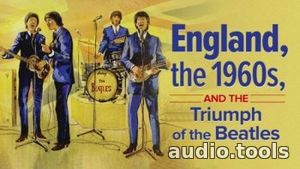TTC England, the 1960s, and the Triumph of the Beatles

TUTORIAL | 4.27 GB
The 1960s was a decade of shifting cultural norms, of challenged conventions, of political upheaval and social rebellion. It was also the decade that brought us a band—and music—that would change England and the world forever.
It has been more than 60 years since the Beatles first blazed across the universe, bringing with them a charming, mournful, raucous, uplifting, experimental, and transcendent sound in songs we still know the words to today: “Hey Jude,” “She Loves You,” “Yesterday,” “I Want to Hold Your Hand,” “Strawberry Fields Forever.”
It’s true that the Beatles fascinate listeners of all ages because of their great, and varied, music. But how did four young men from a faded old seaport in Northern England lead such an epic musical and cultural revolution? Why could the story of the Beatles only have happened in such a charged decade? What remains to be said about this British band that hasn’t been said before?
Questions like these lie at the beating heart of England, the 1960s, and the Triumph of the Beatles. Led by best-selling biographer, Professor Michael Shelden of Indiana State University, these 12 fascinating lectures offer a fresh look at how a pop band became one of the most compelling voices against the status quo. Taking you deeper than any simple music survey, Professor Shelden’s course zeroes in on the cultural backstory of how the Beatles emerged as a worldwide phenomenon and inspired a devotion so strong, it had its own name: Beatlemania. Using the advantages of hindsight, recent scholarship, and interviews with key figures, he reconstructs an incredible period in sonic and social history.
These lectures do, of course, enhance your understanding of the Beatles’ music. But more important, they allow Beatlemaniacs and new listeners alike the chance to appreciate how England helped create this miracle band, and how the band, in turn, influenced both England and so much of the rest of the world.
An Eclectic Blend of Musical and Cultural History
Working chronologically, Professor Shelden takes you through a transformative decade in the history of both music and culture.
Giving equal weight to the Beatles’ early years as they do to the apex of their career and eventual dissolution, these lectures invite you on a whirlwind adventure that reveals the evolution of a band like no other—from school kids to musicians to pop phenomenon to film stars to artists inevitably drawn in separate directions.
But this isn’t simply a lecture series on the Beatles. It’s also a window into—often unknown—cultural events that allowed the Beatles to stage their remarkable invasion of the United States and, after that, the rest of the world.
Professor Shelden traces the subtle ways British culture had established a foothold in postwar America, how the American music scene welcomed the Beatles (and eventually left them behind). He offers pointed revelations about the fickleness of popular culture; the Cold War politics of music lyrics; and the nature of rage, creativity, love, and friendship.
The Stories behind Unforgettable Songs
How you feel about the Beatles’ music is, inevitably, subject to differences in taste and experience. Some fans prefer A Hard Day’s Night while others are more in-tune with the “White Album.” Albums and songs are open to all kinds of interpretation. Professor Shelden’s lectures offer eye-opening cultural insights into some of the band’s greatest hits.
“Help!”: This song, a cry for help by a young man who has gone too far, ought to be moody. Yet the lyrics are sung as a celebration of the singer’s plight, not a dirge. Hours on stage in Hamburg had taught John Lennon to revel in danger and trouble, and belt out every number as if it were his last. At its heart, “Help!” is a primal howl of the kind John would often let loose in his post-Beatles period.
“Back in the USSR”: Written in the second half of the 1960s, this song was so infectious at the time that it was easy for the average listener to overlook the parody and hear only a literal celebration of the Soviet Union. Predictably, right-wing critics in America condemned the song as un-American, especially when paired with another provocative song on the “White Album,” John Lennon’s “Revolution 1.”
“Yesterday”: Paul McCartney spent about three hours recording this song, doing it entirely on his own with an acoustic guitar as his only instrument. What he created in “Yesterday” was the kind of stand-alone classic every songwriter dreams of doing. The soft sound would serve forever more as Exhibit A in the argument that Paul was the composer of sweet melodies and John the genuine man of hard rock. But the reality was never as simple as that.
“Do You Want to Know a Secret”: Intrigued by the secrecy of manager Brian Epstein’s homosexuality, John wrote a coy song about it in “Do You Want to Know a Secret.” Instead of singing it himself, which might have caused Brian anxiety at a time when homosexual love was still illegal, John gave it to George to sing as an innocent romantic tune. Nobody was the wiser until John revealed the truth many years later.
“Like many other Great Courses, this is an intellectual journey,” Professor Shelden says. “You may love the songs, but I want you to stay for the stories and ideas that, I hope, will not only enhance your understanding of the music, but also create a new appreciation for how England helped to create that miracle called the Beatles—and how they, in turn, influenced England and so much of the rest of the world.”
It’s this eclectic blend of cultural history, biography, and music history that makes England, the 1960s, and the Triumph of the Beatles such a fascinating look at how a pop band became one of the most compelling voices against the status quo.
Home page
CLiCK HERE FOR DOWNLOAD

